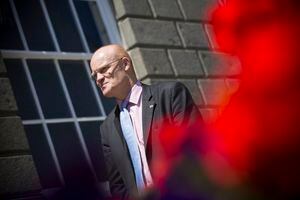Time for a change with probate, says P&R chief
HAVING probate administered by a religious body is ‘an anachronism’ and Policy & Resources intends to transfer it from the Ecclesiastical Court to the Royal Court from the start of next year.

The Ecclesiastical Court’s role in granting probate, from which it derives most of its money, has been reviewed by P&R, whose president Gavin St Pier told States members yesterday that it was time for change.
‘Guernsey is one of the very few jurisdictions in the world where probate is granted and administered by a religious body,’ he said.
‘I think everyone – including the Dean – accept that the continuation of this system is an anachronism and one that, in 2018, needs to be resolved.’
In March 2016, the former Treasury & Resources Department completed a review on the future funding arrangements of the Ecclesiastical Court.
‘Consultees were positive about the Ecclesiastical Court’s service in terms of the speed of granting probate and the friendly and helpful customer service,’ reported Deputy St Pier.
‘The general consensus was that the fees currently charged by the Ecclesiastical Court were reasonable. So while the service and discretion of the current system are not under question, it simply is no longer considered appropriate for that system to be administered through an ecclesiastical court system.’
P&R’s original intention had been to bring a policy letter to the States this week.
‘However, there has been significant correspondence with the Dean, and when we met again earlier this month, it was clear that the Dean and the Policy & Resources Committee had come to a shared set of principles that, if adhered to, would enable modernisation of the probate service while maintaining the levels of service currently provided at reasonable cost.’
The committee will bring a policy letter to the States later this year that formally recommends that the probate jurisdiction be moved to the Royal Court.
‘Our aim, which may be ambitious, is for the jurisdiction to be changed from 1 January 2019.
‘If it is, then the community in Guernsey will notice no difference in services, and no difference in cost, but the probate service will cease to be the function of an ecclesiastical court and instead will be a service provided on behalf of government through the Royal Court.’
Surplus money from the Ecclesiastical Court goes to the Guernsey Deanery Fund and is given to charity or used for church repair work.
The Dean first put the accounts into the public domain in 2016 following many years of requests and pressure from the Guernsey Press to past officials of the court.
Deputy St Pier commended the Dean, the Very Rev. Tim Barker, for doing so. ‘Significant amounts of surplus income from probate fees have been utilised over the years by the Deanery Fund LBG for charitable purposes and community initiatives, but largely for the benefit of the Church of England in Guernsey and its community projects in the Bailiwick of Guernsey,’ said Deputy St Pier.
‘That comment is not intended as a judgment, but simply to state a fact.’
‘Recently formal arrangements for the use of surplus funds have been put in place, which is a further demonstration of the current Dean’s commitment to transparency.’
‘Therefore in addition to the recommendation to move the probate jurisdiction to the Royal Court, it is also recommended that, in future, all surplus probate income accrues to General Revenue.’
‘A decision about allocating funding to the third sector is a separate one that would need to be considered in due course, but for example, the establishment of a social investment commission to support the third sector’s work in the community is one potential area where some of that income could be deployed.’
The Dean, the Very Revd. Tim Barker, welcomed the clarity.
‘I hope that this can be a satisfactory way of moving forward,’ he said.
‘I recognise that it’s the right of the States of Deliberation to make a decision on the excise of probate jurisdiction, they are within their rights, and I’m happy to support them in that.’
Surplus from the Ecclesiastical Court is put in the Deanery Fund for charitable projects and has also been used to fund three projects to renovate church property - the St Andrews rectory, St Johns vicarage and at Torteval Church.
No substantial grants have been made in the last couple of years for church property maintenance.
Money has not been sent to the UK, he said.
How to maintain the other functions of the Ecclesiastical Court, which dates back to around the 13 century, will be discussed as part of the ongoing talks.





